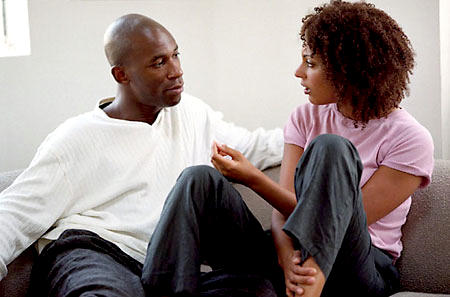I have made some observations over the years of when arguing is effective or damaging in a relationship. There are those who argue for sport and/or argue as a means of communication. There is also “healthy arguing” which should not be interpreted as a sign to break up. There are different types of arguing. The ones we should handle, the ones we can’t handle, and the ones we can handle.
Disagreements are inevitably going to happen between two people, and sometimes it can be rough. The core reason for the argument is sometimes obscured through some sour tone or hurtful things said. How we handle these situations in relationships tells a bit about how communication will be throughout your hard times.

When Arguing is a Good Thing
Think of this like a reptile shedding their skin. For some animals, it’s a painful process, but a necessary one. Immediately after shedding, the skin is very sensitive, leaving the outer skin lying lifeless, really good for nothing other than to move forward. In relationships, having disagreements and showing anger in some ways is the same thing as growing together, getting through a painful moment and needing to be heard. As long as no personal attacks are made and no one is physically being hurt, having disagreements and showing your feelings is normal and healthy for relationships to move to the next level. You become more aware of what you or your partner feels passionately about or is against. As long as you maintain the acknowledgement of what the core reason is, this type of arguing is when cheap shots aren’t taken to communicate.
When Arguing is Unbearable
This is the constant voice-raising, angry-at-everything type of arguing. When someone is so unhappy all the time that their ability to communicate is no longer what most people consider normal. The moment they feel perturbed, their anger becomes heightened – almost uncontrolled and child-like. This is no longer about the core reason, it’s about the person. They have acquired this learned behaviour likely from childhood, and have not discovered any other way to be heard, or how to effectively communicate their needs. These people are combative, and need constant calming, reassurance, and usually suffer from low self-esteem. No matter what the issue is in the relationship, this person will constantly resort to anger or bitter-talk as a means to connect to others. This person may also use threats of breaking up every time something upsets them.
When Arguing is Accepted
There are two parts to this one. When arguing is tolerated out of fear, and when arguing is tolerated because we know no differently.
1. When someone is too-beaten-to-care and becomes used to someone’s bad temper, they often lose sight of what they actually deserve in a relationship. They might also learn to live with it fearing that if they say something, the person may become even more abusive. None of these are okay, and the person who uses their temper as a way to control also knows this.
2. For others, they become a victim of their own circumstance, choosing bad relationships each time as a pattern. They might have grown up to think that constant arguing is normal. These relationships aren’t necessarily bad – but they are based on a lot of ill-formed communication skills. Each partner simply gets comfortable that this is just “the way it is”. People make excuses for this poor communication by then praising the other good qualities that the other person brings to the relationship.

Auntie Ozanne’s Tips During an Argument
1. Make eye contact. For some reason, looking directly at someone gives the signal that you’re listening better. This is especially why arguments over text message or the phone are just awful. When you can’t look at your partner, the more you presume something is worse than it is. This includes staying in the room and not running off at the first sign of an argument. Eventually the core reason will need to be dealt with.
2. Let your partner finish their thought. Just when it couldn’t get worse that you’re arguing about the core reason, not having the ability to spit out what you want to say is even more frustrating. The first part of healing during an argument is therapeutically allowing your thoughts to come out of your mouth. Give your partner this chance to get this out of their system instead of interrupting.
3. Talk about it later. Keyword there is talk. If you find you’re both getting nowhere, then give yourselves a break by going for a walk, taking a time out, or just keep busy until your mind cools off. When you’re in a better mind-space later on, talking will better handle the problem. Remember, arguing is often reactive to something that has happened that moment.
4. Use some key phrasing to remind the person you still love them. You know if your partner can handle hearing some diverting comments during an argument such as, “You’re sexy when you’re mad,” but if they can’t, then try stopping them in mid-fire-spewing and tell them, “I love you and don’t want to argue,” even if it’s hard to admit it at the time. Most people stop dead in their tracks when the other person shows some common sense.
5. Don’t break up. Arguing is the wrong time to make a big decision if you’re an already-established couple. Break ups should be better thought-out, and though an argument or the core reason could get someone to the point to know that this is their decision, someone should have their wits about them after an argument is over so that they don’t make a rash decision. If you find you constantly feel that every argument means “it must be over this time”, perhaps taking a step back and analyzing why you keep thinking that way: is it really part of this particular relationship, or part of how you choose to handle an argument every single time?

No one is expected to tolerate abuse – whether the arguing is based on poor actions or personal shots directed at them for having a difference of opinion. If the relationship is full of problems already, you know it. If it’s not, then understand that you grow together as a couple by facing new challenges together. Know the difference, and fight for what matters.
And lastly:

:)
 Holidays
Holidays  Girl's Behavior
Girl's Behavior  Guy's Behavior
Guy's Behavior  Flirting
Flirting  Dating
Dating  Relationships
Relationships  Fashion & Beauty
Fashion & Beauty  Health & Fitness
Health & Fitness  Marriage & Weddings
Marriage & Weddings  Shopping & Gifts
Shopping & Gifts  Technology & Internet
Technology & Internet  Break Up & Divorce
Break Up & Divorce  Education & Career
Education & Career  Entertainment & Arts
Entertainment & Arts  Family & Friends
Family & Friends  Food & Beverage
Food & Beverage  Hobbies & Leisure
Hobbies & Leisure  Other
Other  Religion & Spirituality
Religion & Spirituality  Society & Politics
Society & Politics  Sports
Sports  Travel
Travel  Trending & News
Trending & News
Most Helpful Opinions